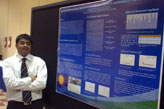Doctoral Student Wins Second Place at PA-AWWA Poster Presentation

Gangadhar Andaluri, a doctoral student in the College of Engineering, received the second-place award at the Fresh Ideas Poster Presentation, a competition sponsored by the Pennsylvania Section of the American Water Works Association (PA-AWWA) during its annual conference, May 13-15, 2008. The award included a $500 cash prize.
Andaluri's poster was titled "Aqueous Phase Destruction of Active Pharmaceutical Ingredients Using Ultrasound" and highlighted the environmental engineer’s ongoing research into the use of ultrasound as an advanced and effective treatment process for destroying chemicals in wastewater.
Andaluri's research is both timely and critical. The noticeable concentrations of active pharmaceutical ingredients (APIs), such as estrogen hormones, in surface water, groundwater, wastewater, soils, and sediments have given rise to environmental concerns worldwide. Because conventional water-treatment processes do not completely remove APIs, "these contaminants are making their way into the environment and surface water," Andaluri said. “Their presence may lead to some long-term effects on ecology. Being an environmental engineer, I would definitely like to help solve some of these issues and protect the environment.”
Andaluri, who has a B.S. and an M.S. in Chemical Engineering, works for the Villanova Center for the Environment (VCE), a multidisciplinary facility where researchers address a number of complex issues, including the decontamination of wastewater, air, and soil. Rominder Suri, Ph.D., P.E., is the director of the VCE and Andaluri's research advisor. In speaking about the importance of Andaluri's work, Dr. Suri said, "Around the world, there is research going on to remove emerging contaminants from wastewater and protect our natural resources, and Gangadhar Andaluri's work is one such effort. His work is making a significant contribution to advance the state of science on this new subject."
Last year, Andaluri received the first-place award at the annual conference, which provides an opportunity for students and young professionals to present the results of their work, to learn about the drinking-water industry, and to network with those in the field. Andaluri was one of six graduate students selected from a pool of applicants to present their posters to a panel of judges at the conference. The top three finalists were recognized at an awards luncheon.
